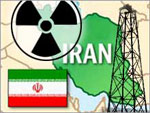 Reuters: A new round of U.S. and European sanctions targets Iran’s dilapidated oil sector from top to bottom, making it even more difficult to maintain output capacity and domestic supplies of fuel.
Reuters: A new round of U.S. and European sanctions targets Iran’s dilapidated oil sector from top to bottom, making it even more difficult to maintain output capacity and domestic supplies of fuel.
By Simon Webb
 DUBAI, July 14 (Reuters) – A new round of U.S. and European sanctions targets Iran’s dilapidated oil sector from top to bottom, making it even more difficult to maintain output capacity and domestic supplies of fuel.
DUBAI, July 14 (Reuters) – A new round of U.S. and European sanctions targets Iran’s dilapidated oil sector from top to bottom, making it even more difficult to maintain output capacity and domestic supplies of fuel.
The United States, seeking to halt Tehran’s nuclear enrichment activities, passed unilateral sanctions earlier this month that for the first time allow it to punish the U.S. operations of international firms who supply fuel to Iran.
Although the world’s fifth-largest oil exporter, Iran lacks the refining capacity to meet domestic fuel demand and relies on imports to meet up to 40 percent of its gasoline needs.
The European Union’s new measures are its first attack on technical assistance and investment in an oil industry already sapped by years of international isolation.
“Companies with operations in the United States are having to be very careful indeed,” said Mehdi Varzi, of independent oil and gas consultancy Varzi Energy.
“The sanctions can be interpreted in any way Congress likes, so anything, even a trade of just a few million dollars, could be seen as abetting the other party.”
While the U.S. has yet to clarify how to interpret its rules, some firms have chosen to implement them strictly, denying Iranian aircraft the right to refuel in international airspace and forcing Iran to rely more on traditional allies for shipments of gasoline.
Washington has said only that the measures apply to firms supplying Iran with cargoes worth more than $1 million or with fuel that has an aggregate fair market value of $5 million over a 12-month period.
That is much less than the approximate market value of around $25 million for just one 35,000 tonne cargo of gasoline. Tehran is importing nine cargoes of that size in July.
RISING COSTS, DWINDLING EXPERTISE
Many international oil firms and trading companies had already stopped supplying gasoline to Iran in anticipation of the sanctions. France’s Total did so soon after the U.S. Congress passed them.
The smaller pool of sellers has driven up the cost of imports to Iran by as much as $10 a tonne, according to oil traders. With imports of around 315,000 tonnes in July, that would add around $3 million to Iran’s monthly import bill.
Further strain on Iran’s finances would add to the progressive impact of sustained sanctions that have made international oil firms leave once projects have been completed.
“Nobody argues about the size of Iran’s reserves. But you have to put a dollar in to get a dollar out. The upstream direly needs investment and isn’t getting it. Iran’s upstream and downstream oil sector is a mess,” said Varzi.
State-run Asian energy firms have taken on more projects as western firms have left, but analysts say they often lack the experience and technology needed by Iran’s oil industry.
This has left Iran struggling to arrest a production decline rate of around 8-10 percent at its mature fields, analysts said, let alone increase output.
In its medium-term outlook published in June, the International Energy Agency forecast Iran’s crude capacity would decline by 675,000 bpd by the end of 2015 to roughly 3.3 million bpd.
In a monthly report on Tuesday, the IEA, which predicted the new sanctions would have a material impact, pegged Iran’s capacity at 3.96 million bpd, below the 4.1 million bpd Iran says it has.
It is difficult, however, to say precisely what Iran’s capacity is as output is limited by targets agreed with OPEC.
SANCTIONS NOT THE ONLY FACTOR
Sanctions are not the sole factor in the decline of Iran’s energy sector. Analysts also blame political interference as President Mahmoud Ahmadinejad has increased his control over the strategic industry, on which government revenues depend.
Companies with connections to Iran’s Revolutionary Guards have taken more energy contracts under Ahmadinejad. This has contributed to delays with projects as some of the firms lack the expertise necessary for the work, analysts said.
“It’s not so much because of sanctions but because of weak management of the sector,” said Bill Farren-Price of consultancy Petroleum Policy Intelligence.
“Unqualified companies are being awarded contracts they are not capable of properly implementing. There is an increasing politicisation of the oil ministry, the National Iranian Oil Company and the contractors.”
Even with the upstream and downstream impact of the latest sanctions, there are those who say Iran would find a way to maintain the sector and who are unconvinced by the latest measures.
“I think the sanctions have in fact been token sanctions. I think the global consumers realise that Iran is a very important player in the energy industry and they are not going to do anything that damages the industry without having repercussions on their own economies,” said Sadad al-Husseini, a former senior official at Saudi state oil firm Saudi Aramco.
“For the longer term, there will be enough countries that are concerned about Iran’s output,” he said, naming China and India as examples. “It’s never easy to make an embargo hold across the world.”
(Additional reporting by Aizhu Chen in Beijing and Barbara Lewis in Dubai; Editing by Barbara Lewis)


